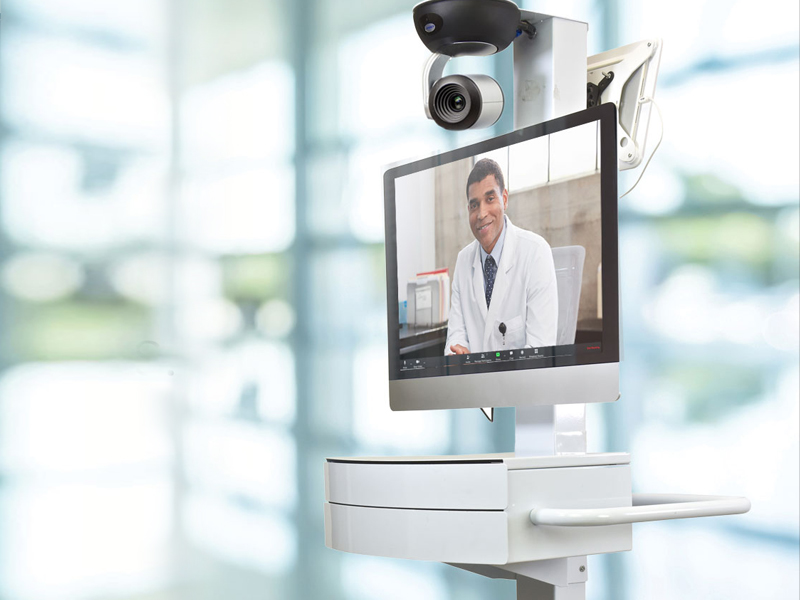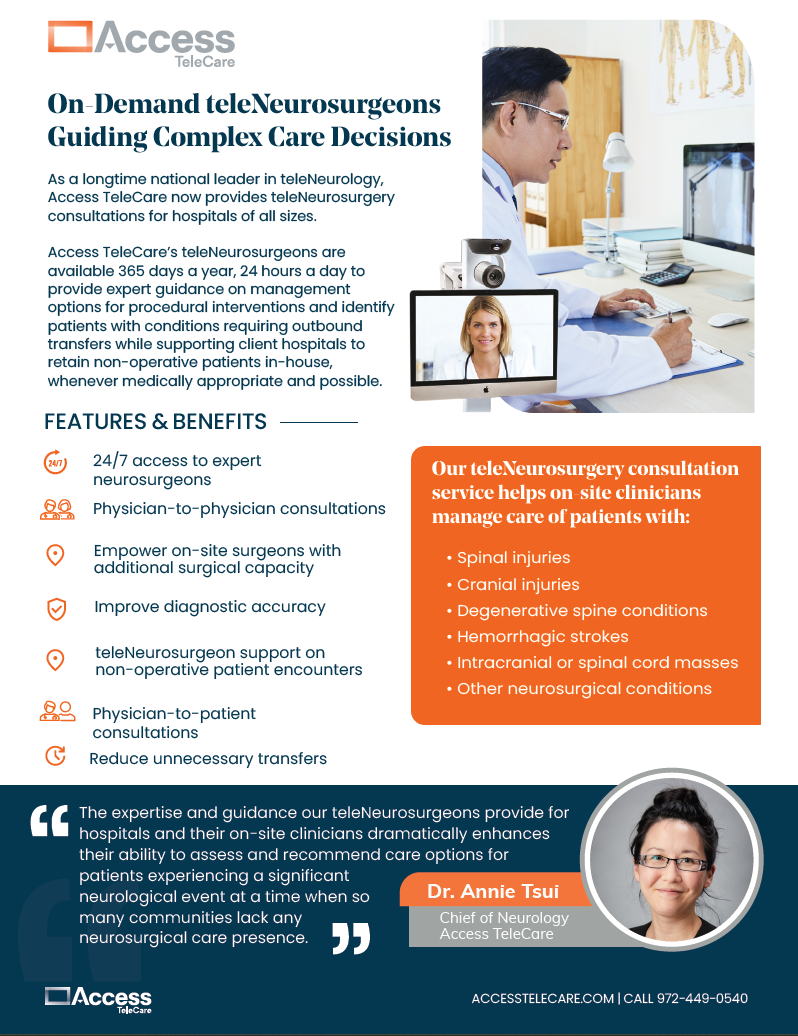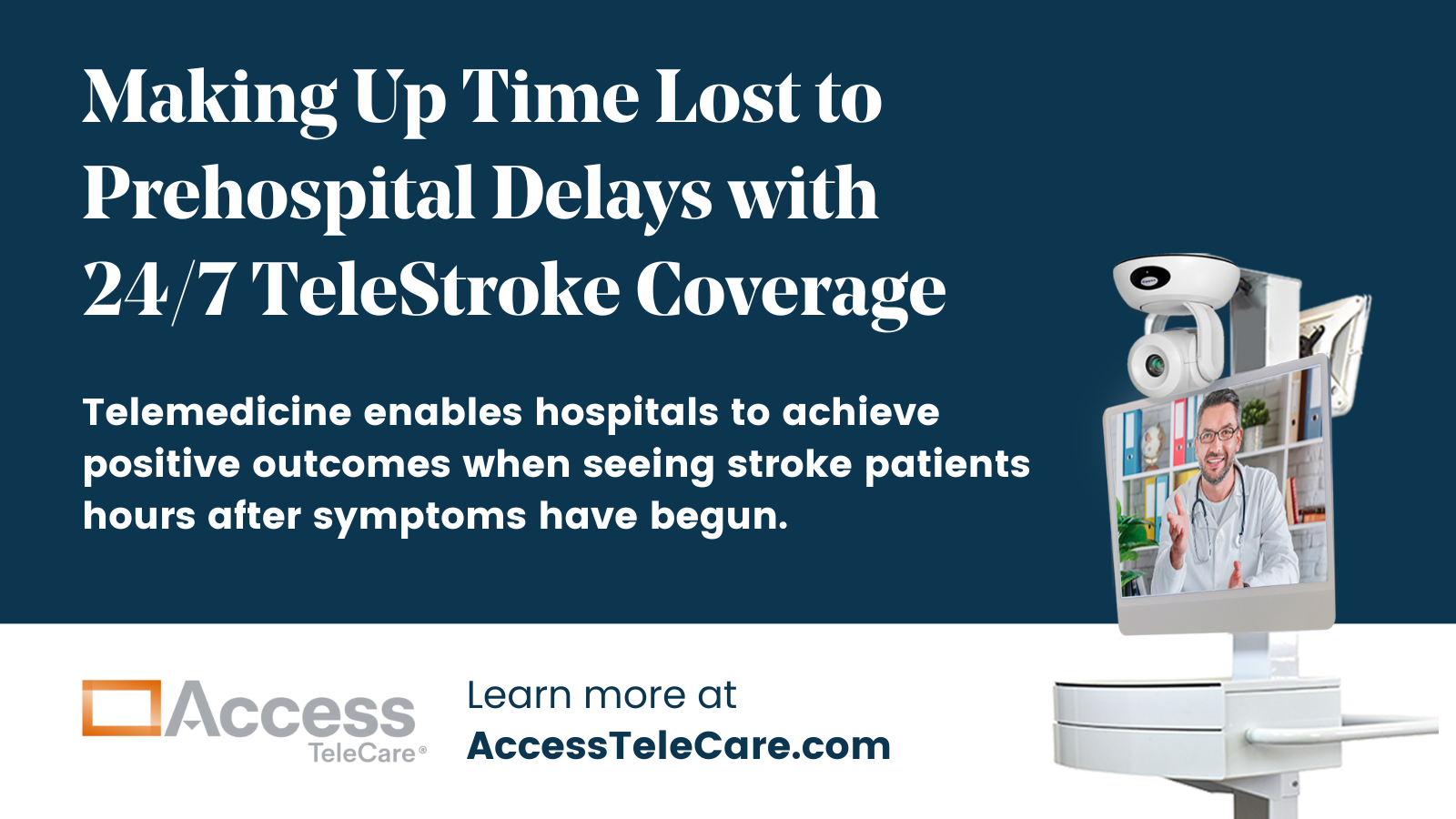TeleNeurosurgery Consultations
Helping hospitals reduce outbound transfers and retain non-operative patients, whenever medically appropriate and possible.
TeleNeurosurgeons consult with the patient, neurologist (either in-person or remote), and on-site clinicians and assess the need for surgical intervention to help on-site teams feel more confident about appropriately keeping post-thrombolytic patients in their local communities of care and home support networks.
TeleNeurosurgery Consultations Help Keep Patients Local
On-demand access to teleNeurosurgeons optimizes the use of effective intervention with IV thrombolytics for patients experiencing an acute ischemic stroke in two ways:
-
Providing timely expert specialty consultations to emergency department teams to appropriately diagnose an acute ischemic stroke and administer thrombolytics, if indicated.
-
Overcoming hesitancy to keep post-thrombolytic patients in the local hospital due to the accompanying risks of its use, including intracranial bleed, and the potential need for neurosurgical evaluation.

Key Benefits of Access TeleCare teleNeurosurgery Programs
Reduce Unnecessary Transfers
Reduce Unnecessary Transfers
By using teleNeurosurgery consultations, hospitals can significantly reduce the need for transferring post-thrombolytic stroke patients away from their communities for care.
Cost-Efficiency for Hospitals & Patients
Cost-Efficiency for Hospitals & Patients
Access TeleCare’s teleNeurosurgery programs help providers avoid the costs associated with transferring post-thrombolytic stroke patients and patients and their families can avoid travel expenses, missed time from work, and other costs associated with traveling far from home for care.
Improved Utilization of Resources
Improved Utilization of Resources
Access TeleCare’s teleNeurosurgery programs help on-site teams optimize the use of available resources when treating patients who require thrombolytic and post-thrombolytic care, and identify patients who do not require a transfer or neurosurgical intervention.
Increased Accessibility for Patients
Increased Accessibility for Patients
By making expert neurosurgical consultations available to on-site teams regardless of the local availability of neurology or neurosurgery experts, Access TeleCare brings more patients closer to timely, expert care.
OUR PROGRAMS IN ACTION
On-Demand teleNeurosurgeons
Guiding Complex Care Decisions
Guiding Complex Care Decisions
Access TeleCare’s teleNeurosurgeons are available 365 days a year, 24 hours a day to provide expert guidance on management options for procedural interventions and identify patients with conditions requiring outbound transfers while supporting client hospitals to retain non-operative patients in-house, whenever medically appropriate and possible.

How Access TeleCare breaks barriers to IV thrombolytic use:
Overcoming Neurologist Shortages: Not every hospital or emergency department has access to a neurologist who can determine the type of stroke – ischemic or hemorrhagic – and who can promptly direct administration of the IV thrombolytic and post-thrombolytic care. The shortage of neurologists nationwide is well-documented and is particularly acute in rural areas, leaving many communities without access to emergency neurological expertise in the event of a stroke.
Addressing clinician concerns surrounding
post-thrombolytic complications
Most post-stroke patients will never need neurosurgical intervention. Just 44 of the nearly 800,000 strokes that occur in the U.S. each year would require neurosurgical intervention following IV tPA administration, according to a 2013 study (Journal of Stroke and Cerebrovascular Diseases). Access to teleNeurosurgery consultations can support on-site hospital clinicians’ decision-making for post-thrombolytic patients. Neurosurgical expertise can identify patients who are most likely to need surgical intervention – and assist in initiating transfers for those patients promptly and appropriately to a higher level of care – while retaining patients who don’t require a transfer.


Dr. Annie Tsui
Chief of Neurology | Access TeleCare
“Access TeleCare is pioneering the use of teleNeurosurgery consultations, building on its legacy of leadership in telemedicine and its large teleNeurology footprint.
The addition of on-demand teleNeurosurgery consultations is the next step in building and deploying clinical programs that address the full continuum of neurological care for hospitals of all sizes and improving access to specialty care for patients experiencing a stroke, no matter where they live.”
TeleNeurology Solutions
TeleNeurology Articles
Telemedicine Solutions to Hospitals’ Most Pressing Challenges: Becker’s Webinar Recap
Access TeleCare CEO Chris Gallagher, M.D., and UnityPoint Health [...]
Making Up Time Lost to Prehospital Delays with 24/7 TeleStroke Coverage
Key Points Over half of patients in a recent [...]
Summer Heat Increases in Stroke Risk: How TeleStroke & TeleNeurology Can Help
TeleNeurology Coverage can Help Hospitals Meet the Need for Emergent [...]


















